Brothers in Arms Read online
Page 5
‘Sir, my lord Argyle presents his compliments and would you lead the advance across the bridges forthwith.’
The ageing colonel looked somewhat put out by this ungentlemanly behaviour on a battlefield. Nevertheless, he nodded at the young man and, taking his thin sword from its scabbard with a conscious flourish so that it caught the sunlight and drew the eye, he made a half turn in the saddle. It was now the turn of his own low, gently cultivated Highland accent to ring out over their heads.
‘My boys. You’re luck’s in at last. We’ve been ordered to advance.’
He waited for the cheer, and come it did, just as loud and hearty as he had expected from his men.
‘Now’s your chance, my lads. Do your duty and bring honour to your Queen, to your country and most important to your regiment. We fight this day for Scotland and the Union, boys. For Queen Anne and the regiment. For my regiment. For me. Now follow me to glory and fortune, lads, and I’ll pay you all in beer and golden guineas. Officers, take posts. Drummers, if you please, your sticks. Major Frampton, advance the colours.’
The adjutant, Charles Frampton, stood high in his stirrups and waved his hat three times in the air. ‘Three cheers for the colonel and the regiment. Hip hip, huzzah. Hip hip, huzzah …’
The men’s voices rang out across the field and mingled with those from the other regiments in the vanguard of the brigade who at that moment were going through the same adrenaline-raising ritual. Steel turned to the Grenadiers and raised his voice.
‘Stay with me, boys. Look to your sergeants. Look to your officers. But most of all look to me. When we go in we’ll like as not leave the rest of the battalion standing. That’s why we’re here. First in, last out, lads. Stay with me. Sergeants, keep your lines straight until we close. Halt at sixty paces and give fire. And if you do that for me, boys, and if you stand when the enemy fires on us, then bugger what the colonel has to offer. I’ll stand any man a pitcher of rum that can beat me into the French lines.’
There was another huge cheer from the company, and then Slaughter and his sergeants and corporals were dressing the lines yet again, pushing them into attacking formation, a defile column of threes. This was the only way to cross the bridge. It was the most vulnerable formation for infantry, and looking at them standing fifteen ranks deep, spaced half open, Steel worried about the potential effect of enemy gunfire. Should a single cannonball find its mark in his advancing column it would not stop but would continue to hurtle through, taking with it heads and limbs, and killing or at the least maiming an entire file.
The drums beat up the march attack, the familiar rhythm of ‘British Grenadiers’.
Steel turned back to face the front. He said quietly to Williams, ‘All right, Tom? Ready for it now?’
‘Fine, sir, and as ready as ever.’
‘Then let’s be at them.’
With Argyle riding at their head, the brigade of redcoats moved off. Steel trod firmly onto the wooden bridge and marched as steadily as he could across its creaking, swaying structure as it moved from side to side across the string of pontoons in the river. Looking to his right and his left he could see on the four other similar bridges other officers leading their men in precisely the same way. Grenadiers to the fore, the mounted colonels behind them, bringing up the battalion. It was a heart-stopping sight, and it never failed to make him puff with pride: a full brigade of British infantry marching into battle. Surprisingly, his greatest fear was unfounded, and as they were crossing no French guns found them. Evidently the gunners felt themselves unable to fire for fear of hitting their own men. Once off the bridge they began to climb a shallow slope. Soon the entire battalion was following them.
From behind he heard the adjutant taking command of the regiment: ‘’tallion will form line. Right about.’
Steel half-turned his head and in turn shouted an order to the company: ‘Form line. Right wheel. Number two platoon mark time. Form on the left.’
Steel watched as Hansam deftly guided his half-company away from Steel’s and took it to the left flank of the advancing regiment, thus ensuring that each flank was covered by half of the elite grenadiers.
Williams took up the general order, followed by Slaughter and the sergeants, and instantly Steel’s Grenadiers began to wheel to the right, followed by the other eight companies of the regiment, pivoting on the right-hand man of each rank so that within seconds they were marching towards the east. Steel led them on. Sixty paces. A hundred. That would do it.
‘Left wheel.’
Again the Grenadiers turned, this time moving on the left-hand man, and as if by a miracle of choreography found themselves again facing the front and the French lines. To their left the remaining eight companies of the regiment were spaced at roughly equal distances, having managed the same manoeuvre.
Steel let himself relax for an instant. That was the first task done. Slaughter went along the front of the line, dressing it with his halberd. Steel saw Colonel Farquharson ride to the front, accompanied by Major Frampton and the battalion drummer boys, ashen-faced with terror in their gorgeous gold and blue livery. Again the colonel lifted his hand in the air and brought it down towards the enemy. Then slowly he yelled the order to his regiment:
‘Advance!’
Steel raised his own sword high in the air and flourished it over his head three times. It was a little showy perhaps, slightly Frenchified even, but he had become used to the gesture and the men seemed to approve and be fired up. He shouted the command: ‘Advance!’ Steel lingered on the first syllable and on the last brought down the sword so that was pointing directly towards the enemy. Then he laid it gently on his shoulder. With the drums beating the steady rhythm of the Grenadiers’ march, the entire line, close on five thousand men, began to climb the hill from the river. Soon they found themselves parallel with a road running across the battlefield, southwest to northeast, lined on both sides with tall poplar trees.
Steel reckoned that they were now halfway to the French lines, and as he began to calculate the distance and how long it might take them to make contact should they continue their advance the guns on the hill in front of them opened up. He called out, ‘Steady!’ But hardly had he said it than the first cannonball whistled into their line and cut a swathe through the Grenadiers.
‘Steady, lads. With me.’
He wondered how many batteries the French had ranged against them. Cursed himself for not having counted them when he could have. Behind him the rank and file continued their advance, despite the lethal rain of shot now flying towards them. Good, he thought: words of encouragement, camaraderie and most importantly the hard pikestaffs of the sergeants were doing, had done, their job. Another fifty paces. A hundred and they were getting close enough to see the regimental facings of the enemy infantry when the drifting smoke allowed. The smell of powder invaded his nostrils and he wondered whether perhaps he shouldn’t have accepted Hansam’s generous offer of some snuff. Perhaps he would take it up before the next battle. It wouldn’t be long now, he thought. Not long until they felt the sting of musket fire from those men on the hill. Looking to the right he could see that they were beginning to draw parallel with what remained of Cadogan’s original holding force.
Suddenly, from his left three horsmen appeared. Steel recognized one of them as the Duke of Argyle. From behind he heard Frampton’s shouted battalion command and a change in the drum beat: ‘Wheel to your right.’
As one, the line of redcoats began to turn, and then, led by the Scottish general, continued to advance up the slope, obliquely towards the French guns.
This was new madness, thought Steel. A cannonball tossed at them now would bowl through them like ninepins. And, sure enough, the roundshot began to pour in. There was a cry from his rear and Steel turned momentarily to see the body of a Grenadier crumple to the ground minus its head and gouting blood, its gaiters still stained yellow with vomit. One of the new lads, he thought. Poor bugger. But at the same time, like any soldier under fir
e, he was well aware that it could as well have been him and he muttered a silent prayer to providence for sparing him – yet again.
Casting a glance to the left he saw that their place on that side of the line was gradually being taken by a mass of foreign infantry. Perhaps a score of battalions of Prussians and Hanoverians in blue and red had crossed over the pontoon bridges in their wake and were labouring up the hill before the French could turn their flank. In turning now they passed in line through the small hamlet of Schaerken, abandoned it seemed by its sensible inhabitants. It had not been much damaged in the fighting as yet, although one house had been set on fire. Thankfully, thought Steel, it was not the inn.
He pointed at the tavern sign and yelled out to anyone that might be in earshot: ‘There we are, boys. Didn’t I tell you if we took this field I’d buy you the best in the house? Well, there’s the bloody house. Remember it. Follow me to the French and after we’ve won I’ll wager the Duke himself will stand you to anything that’s on the menu there.’
There was a cheer, but only from the veterans. The new, green troops, he noticed, although they continued to advance doggedly, said nothing.
Another cannonball crashed into their ranks and left a sea of groaning dead and wounded men. From somewhere within the confused tangle of dead, wounded and unscathed bodies a single voice began to sing. Private Coles was doing what he always did, fending off the bullets with an invocation to the Almighty. It was a song, although Steel himself would have been the first to say that it was hardly what you might have called a melody:
‘Bless the Lord, O my soul,
And all that is within me
Bless his holy name.
Bless the Lord, O my soul,
And forget not all his benefits,
Who forgiveth all thine iniquities;
Who healeth all thy diseases;
Who redeemeth thy life from destruction;
Who crowneth thee with loving kindness and tender mercies …’
Clearly the man intended to continue, but as they walked on over the dead and wounded, trying in vain not to walk on living flesh, Steel heard another voice rise above the holy words. Slaughter growled out an order: ‘Coles. I’ll give you tender bloody mercies. There’s no mercies here. Nor no benefits or kindness either. Now shut that noise.’
‘But, Sarge, it’s the 103rd Psalm. It’s the Lord’s word.’
‘I don’t care if it’s the first bloody Psalm or if your sainted bloody mother wrote the whole of the bloody book. Shut your wailing now or you’ll be on sergeant’s orders for the rest of the month. That is if you live through this bloody battle, which, given your closeness to the Almighty, I very much doubt. He must be keen to see you, Coles, you talk to him so much. But I’ve got no appointment with him, so shut your bleeding trap or I’ll do it for you. Last thing I want on this battlefield is a bloody bible-basher. Upsets the men.’
But the God-fearing Coles was not finished: ‘But they seem to like it, Sarge.’
‘Coles. What is it you don’t understand? Are you a fool as well as deaf? I don’t care what the men like and what they don’t like. Fact is, I don’t like it! So shut your trap.’
‘Yes, Sarge.’
For all the fire pouring in on them from the hill, Slaughter’s clever outburst had broken the spell of death that had hung over the advancing company, and a few of the men were grinning now.
Then Steel heard another voice, one of the recruits: ‘Bloody hell, Sarge. I mean, look, sir.’
Steel looked up to his front and peered into the clearing smoke. What met his gaze almost brought him to a standstill. It was everything he could do to carry on. For directly in front of them, at a distance of perhaps eighty yards, was an endless, unbroken line of grey-coated French infantry. As Steel looked on they levelled their muskets until he was staring down the barrel into the blackness of oblivion.
He called back: ‘Steady, boys. Keep going now. Not long –’ But the last syllable of his words was clipped away by the crash as the fire from four hundred muskets spat four hundred three-quarter-ounce balls that ripped holes in James Farquharson’s red-coated regiment of foot. Steel looked quickly over to the left to where the colonel had been riding with the colours and drummers at his side. Miraculously Sir James appeared to be unhurt. One of the drummer boys was down and dead, and Steel saw the brass spike-tipped top of one of the flagstaffs falter, indicating that an ensign had been hit, but then the colour was raised up again. Several gaps had appeared among his own company. But this was no time to think of losses.
‘Close up. Close your ranks. Keep going. With me.’
The order was repeated along the line as sergeants and corporals ran along the files.
A faint cry arose above the cacophony of drums, cries of pain, flying shot and yelling men: ‘Halt.’
Major Frampton had halted the entire battalion sixty paces from the enemy – the exact prescribed distance for a volley. Steel noticed that the two sides were separated by a small stream which ran down from the top of the big hill they called the Boser Couter and along the entire Allied front line. He saw too that the French were already reloading. He barked out the command and slipped quickly between the ranks to a new position.
He found Slaughter. ‘We’ll give them a firefight here, Jacob. By platoons. We can do better than that ragged excuse for a volley, eh? And by God we’ll give them a shock.’
By prior orders from the brigade, Steel’s Grenadiers were not to be held as was the usual practice in reserve during such a firefight, but would loose off their own volleys, adding to the firepower of the battalion.
‘Firing by platoon, sir?’
‘Fire by platoon, Sar’nt. Three firings each of six platoons. And the only means they have of countering such a fire is to come at us, as they will, with the bayonet. And frankly, Sar’nt, I don’t think they’ve the stomach for it today. So what will they do? Stand and fire at us? They can get off three shots a minute at the most. And I warrant they’ll not manage two. And then we’ll have at them.’
Slaughter nodded, knowing the grim truth in Steel’s words: Farquharson’s, like the other regiments in the British army, was composed of nine companies each of a field strength of around fifty men, and each of those companies was subdivided into two, including the Grenadiers. In a firefight such as this they would be ‘told off’ as one and two. The trick was that within each of those two platoons another six units or small platoons had also been nominated, and it was these which provided the continuous fire which the French had come to fear so much. Using this system, Farquharson’s and the other British foot would be able to fire six small volleys every minute. And, Steel asked himself, what troops in all the world could stand under a volley every ten seconds?
He barked the command: ‘Advance to half distance. Make ready.’
Down the line the men cocked their muskets and the front rank knelt on their right knees, placing the butt on the ground with their thumbs on the cock and their finger on the trigger. Behind them the second and third ranks closed forward.
‘Sar’nt, I think that we might dress the lines. Keep the barrels down. You know the drill. The new lads might think they’re on a partridge shoot.’ He turned back to the line: ‘Present.’
Along the length of the company and all the way down the long line of the regiment, all three ranks raised their weapons: Tower Armoury weapons, the finest that modern technology could produce, forty-six inches long, brass mounted and firing a .76 calibre ball.
Slaughter smiled and wandered off to line his pike along the levelled musket barrels until they were all pointing roughly towards the enemy’s stomachs. An inaccurate musket might easily miss the killing zone of a head. But a shot that went into the torso, packed as it was with vital organs, even if it didn’t kill a man, would certainly render him hors de combat for the rest of the action.
Steel sensed that someone was behind him, and turning found the odious adjutant, Major Frampton, looking down at him from horseback as
he made his way along the flank, ordering the lines.
Frampton nodded at Steel. ‘Steel. Good day. Your men look keen. Keep them to the fore, Steel. They are Grenadiers, you know.’
He smiled, not meaning the compliment, and rode off to the other flank. Steel wondered whether he would survive. Unpopular mounted officers, and few were more unpopular than Charles Frampton, made a tempting target if you had a crack shot in the battalion. He brushed fantasy aside and turned back to the job in hand.
Frampton’s voice rang out to the battalion: ‘First firing. Take care … Fire!’
But the French had now reloaded and as the guns fired from the British line, so they did from the enemy ranks. It seemed to Steel that the air had become a storm of musket balls, and he saw men fall all along the red-coated line. But then looking across he saw through the smoke to his left that the French too had taken losses. The regimental drummers beat a short preparative tattoo which had the men at the ready.
Again Frampton’s voice sang out: ‘Second firing … fire.’ The second platoon fired and more of the grey-coated infantry fell. But the slower French had not yet reloaded and were unable to return fire.
The drums beat up again. And again the command came: ‘Third firing.’ It was the turn of the Grenadiers this time. They cocked their weapons.
‘Fire!’ A deafening report was followed by billowing white smoke, and Steel knew that by now the French would be suffering badly. And all this in only thirty seconds. The theory was that it should be possible for 2,000 men to fire 10,000 rounds in a single minute. Looking down the line and all along the brigade, Steel wondered whether today might not prove the theorists right.

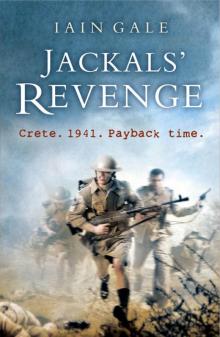 Jackals' Revenge
Jackals' Revenge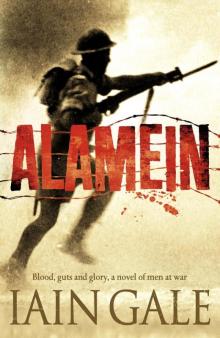 Alamein
Alamein Conspiracy
Conspiracy Four Days in June
Four Days in June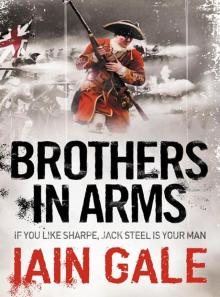 Brothers in Arms (Jack Steel 3)
Brothers in Arms (Jack Steel 3) Brothers in Arms
Brothers in Arms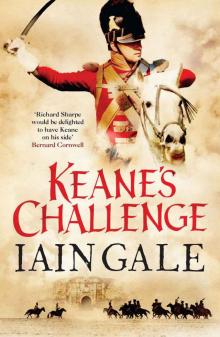 02 - Keane's Challenge
02 - Keane's Challenge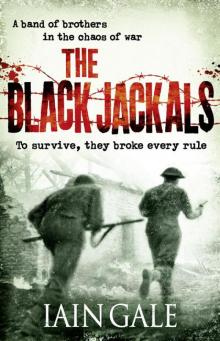 The Black Jackals
The Black Jackals Man of Honour
Man of Honour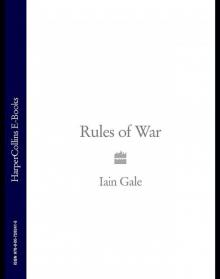 Rules of War
Rules of War